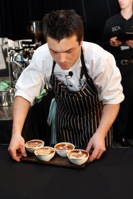| Daily Telegraph 11 May 2009 |
|
"Coffee Break" special advertising report A multitude of sins are committed every day in cafes across Sydney, according to Paul Jackson. Seeing a poor-quality blend, a disinterested barista or, horror of all horrors, a dirty machine, can really ruin his day. Founder of the Danes Gourmet Coffee Institute and director of Danes Gourmet Coffee, Mr Jackson isn't ashamed to admit he's a little obsessive when it comes to coffee. In fact, it's an attribute he encourages in all aspiring baristas at the Institute. "Coffee is more chemically complex than any other drink in the world," he says. "It requires a level of obsessive compulsive in the barista. Because there are so many variables, it's a constant juggle. If the care and attention aren't there, bringing all these variables together isn't going to happen." While some argue that getting the milk right is the key to a good coffee, Mr Jackson says milk is just the icing on the cake, and something which can come easily after a month or two of practice. The real challenge is "getting inside the coffee particle and figuring out what's happening in terms of physics". And besides, he adds, purists take their coffee black. "A good machine and calibrating the machine helps, but it must be kept clean during the course of the day," he says. "Oils will go rancid within a group handle - where the coffee goes - within an hour". "The level of pressure and temperature must be just right. It it's too hot, it will burn, if it's not hot enough, the coffee will have a sour taste. If there's not enough pressure, it won't be extracting or stripping the oils properly." The aroma of a good coffee is clean and almost sweet, but the biggest telling factor is the after taste. "It should give you a pleasant velvety mouth feel, which lasts for many minutes," Mr Jackson says. He sums up the key requirements of a good barista in four words: "Care, attention, intention and passion. There's a coffee maker, then there's a barista - just like the difference between a cook and a chef. I don't expect the barista to be doing cartwheels, but you can tell if they're passionate about what they do or if they're just pulling a shot." According to Mr Jackson, coffee making is a craft which can take many years to perfect, but it can be rich in rewards. "It's not just a bar job anymore," he says. "It's a profession." A barista can go from being a cafe employee to opening their own cafe, importing machines and roasting their own coffee. What's more, the skill is internationally transportable. Paul Bassett is one example. After topping Australian barista competitions at a young age, he went on to become the World Barista Champion in 2003. He has since become a brand ambassador for Sunbeam, playing a major role in the development of their coffee machines and grinders. Mr Bassett has also opened an espresso bar/coffee roastery concept store in Tokyo, and has produced several coffee-related documentaries. According to Mr Jackson, Australia will soon reach a point where achieving the perfect brew won't just be about thriving - it will be about surviving. With more Australians becoming aware of how a good coffee should taste, they're starting to vote with their feet, and cafes which fall behind in quality will fail. "When someone tastes a good coffee, they can't go back to an ordinary one," Mr Jackson says. "As coffee culture in Australia continues to grow, and competition between cafes becomes greater, a much higher standard will be demanded. We've come a long way in the last 10 years, but I still see a multitude of sins being committed." Think you've got what it takes to make 12 coffees in 12 minutes - and get the taste and presentation just right? Registration for the Danes Grand Barista Championship 2009, to be held at Manly Yacht Club on August 15, is now open. A panel of coffee industry experts will judge on the basis of beverage presentation, barista technique, personal presentation, service and most importantly flavour. Now in its eighth year, the competition has expanded beyond our shores to attract top baristas from Thailand, Korea, Hong Kong and Singapore. The winner will receive a commercial Orchestrale Etnica coffee machine valued at $8700, plus a trip to Milan to appear on the Orchestrale stand at the Host International Exhibition. |
 Passion and a Perfect Brew
Passion and a Perfect Brew


